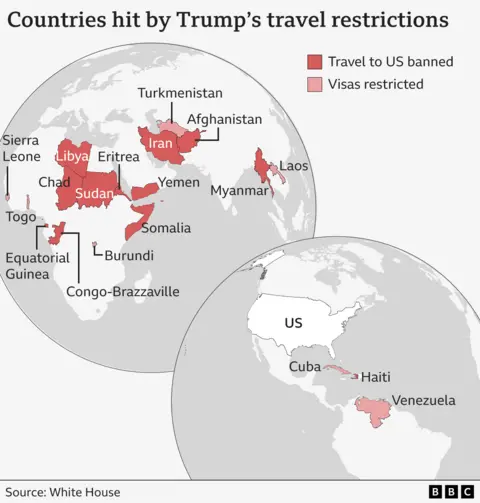Why are these 12 countries on Trump's travel-ban list?
A travel ban issued on Wednesday by US President Donald Trump is set to primarily affect countries in Africa and the Middle East.
Twelve countries face full bans, which will come into force on Monday. People from a further seven nations are facing partial restrictions.
Trump has depicted it as a matter of national security. He cited a recent attack on members of Colorado's Jewish community, which was allegedly carried out by an Egyptian national. Egypt itself is not on the banned list.
Other reasons cited include alleged breaking of US visa rules by people from the countries in question. Here is a closer look at some of the president's reasoning.
Afghanistan
A range of accusations have been made against Afghanistan in a presidential proclamation signed by Trump. The document highlights that the Taliban, which controls the country, is a Specially Designated Global Terrorist (SDGT) group.
The move comes just weeks after the Trump administration appeared to signal that it believed the situation had improved in Afghanistan, when it announced the end of Temporary Protected Status (TPS) for Afghans living in the US.
Afghanistan is further accused by Trump of lacking a "competent or co-operative" central authority for issuing passports or civil documents. As with other countries on Trump's list, the issue of Afghan nationals overstaying their visas is also cited.
Iran
Trump's proclamation identifies Iran as a state sponsor of terrorism - a longstanding charge that the Middle Eastern nation has previously rejected.
The US has previously censured Tehran, Iran's capital, for its alleged sponsorship of proxy groups operating in the region, such as Hamas and Hezbollah.
The new proclamation from Trump says the country is "the source of significant terrorism around the world", does not co-operate with the US on security risks and has "historically failed to accept back its removable nationals".
The move comes amid diplomatic wrangling between the two sides over the creation of a new deal over Iran's nuclear weapon-building capabilities.
Somalia and Libya
Similar reasons are given in the case of Somalia. The east African country is branded by Trump as a "terrorist safe haven". Like Iran, it is also accused of failing to accept its nationals when removed from the US.
However, a further point was made by Trump: "Somalia stands apart from other countries in the degree to which its government lacks command and control of its territory, which greatly limits the effectiveness of its national capabilities in a variety of respects."
Somalia's internationally-based government faces a significant challenge from armed Islamists. It has pledged to "engage in dialogue to address the concerns raised" by Trump.
Libya, in north Africa, is cited for its "historical terrorist presence", which is painted as a security threat to Americans.
Libya and Somalia are also among the countries on Trump's list which have been criticised for their perceived incompetence at issuing passports.
Haiti
The document highlights that "hundreds of thousands of illegal Haitian aliens flooded into the United States during the Biden Administration".
Trump points to various perceived risks that this has entailed - including the creation of "criminal networks" and high visa overstay rates.
Data from the US Census Bureau suggested more than 852,000 Haitians were living in the US in February 2024, though it does not give a breakdown of when those migrants arrived.
Many came after a devastating earthquake in 2010, or after fleeing gang violence that took hold in the Caribbean nation. The US president also points to a lack of central authority in Haiti for matters including law enforcement.

Chad, Congo-Brazzaville, Equatorial Guinea
These countries are solely accused by Trump of having relatively high visa overstay rates.
The Department of Homeland Security (DHS) defines an "overstay" as a person who remains in the US beyond their authorised period of admission, with no evidence of any extension. The "rate" signals the proportion of people who overstayed.
The central African nation Chad is singled out for showing a "a blatant disregard for United States immigration laws".
The document highlights an overstay rate of 49.54% by Chadians on business or tourist visas in 2023, citing a DHS report.
Congo-Brazzaville and Equatorial Guinea have equivalent rates of 29.63% and 21.98% respectively. But these rates are lower than Laos, which faces a lesser restriction.
Myanmar
Myanmar - referred to as Burma in the Trump proclamation - is similarly accused of a high visa overstay rates.
As with others on the list, including Iran, the country is further accused of not co-operating with the US to accept deported Burmese nationals.
Eritrea, Sudan and Yemen
For each of these countries, the first allegation made by Trump is that they have questionable competence at issuing passports and civil documents.
Eritrea and Sudan are further accused of having relatively high visa overstay rates. Eritrea is also blamed for failing to make the criminal records of its national available to the US, and of refusing to accept deported nationals.
As with Somalia, Yemen is also accused of lacking control over its own land. Trump's proclamation highlights that it is the site of active US military operations. The US has been combating Houthis, who have seized much of the north and west of the country during an ongoing civil war.
Partial restrictions
People from seven other nations face partial restrictions:
- Venezuela is accused of lacking a "competent or co-operative" central authority for issuing passports and similar documents. Allegations of visa overstays and a refusal to accept deportees are again mentioned. In response, the South American country has described the Trump administration as "supremacists who think they own the world"
- Cuba is labelled as another "state sponsor of terrorism" - a designation that was made by the US in 2021, and condemned by Havana. An alleged refusal to accept deportees is also mentioned, as are visa overstays
- Visa overstays are again presented as the key issue in the cases of Burundi, Laos, Sierra Leone, Togo and Turkmenistan
